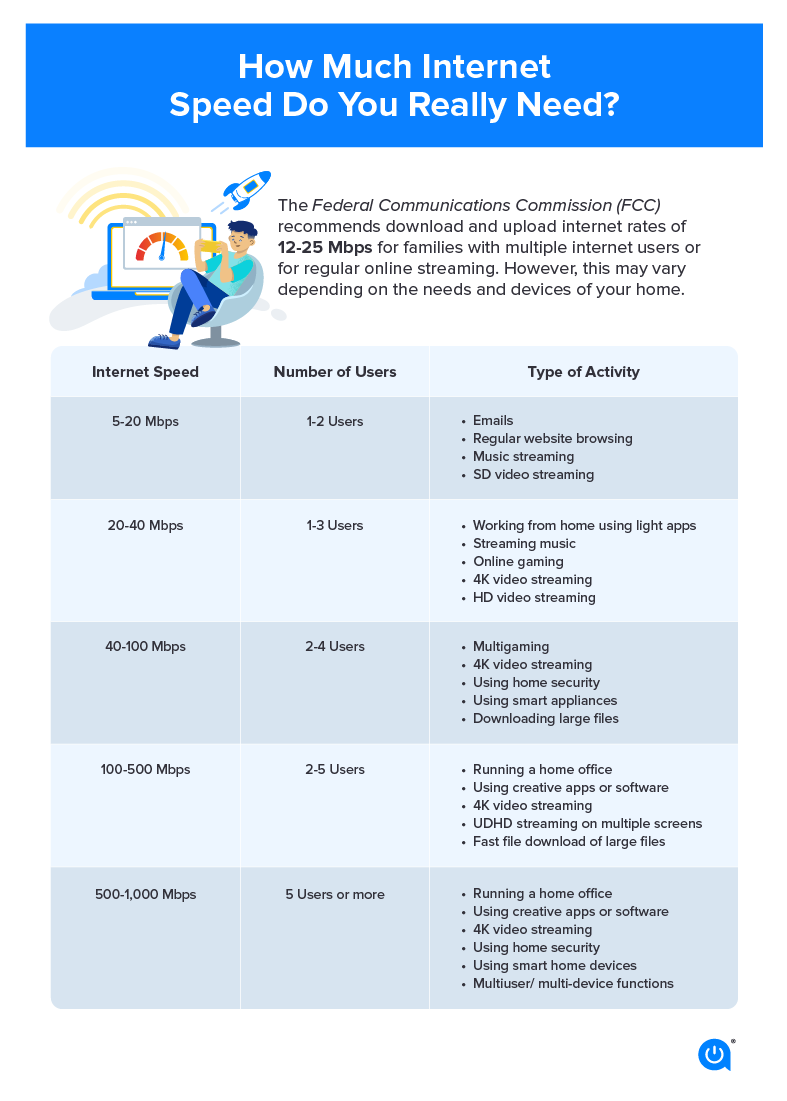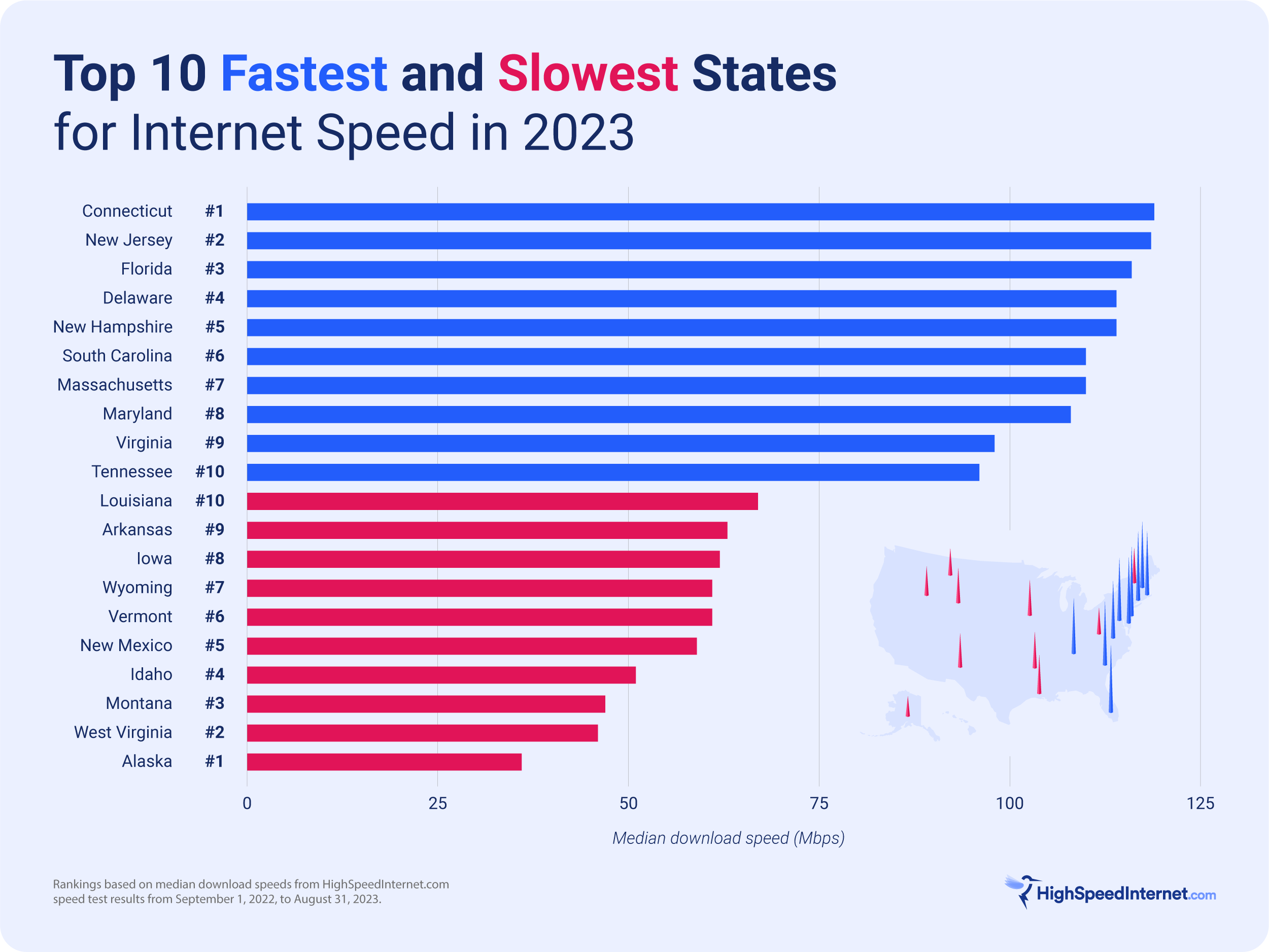Recognizing Just How Megabits Per Second Affect Your Internet Experience
Recognizing Just How Megabits Per Second Affect Your Internet Experience
Blog Article
Exactly How Megabits Per Second Impact Your Online Activities
The idea of megabits per second (Mbps) plays an essential function fit our on the internet experiences. As electronic tasks multiply, comprehending the ramifications of Mbps on streaming, video clip, and video gaming conferencing comes to be significantly essential. Higher Mbps can enhance efficiency and minimize interruptions, while insufficient speeds might cultivate aggravation and inefficiency. Assessing your house's details needs in connection with these speeds is vital, particularly as multiple tools contend for data transfer. The subtleties of how Mbps influences different online activities necessitate additional exploration, especially as our reliance on electronic connectivity proceeds to progress.
Recognizing Megabits Per Second
When taking into consideration web speed, it's necessary to comprehend the principle of megabits per second (Mbps), which functions as a conventional dimension for information transfer prices. This statistics measures just how much data can be transferred over an internet connection in one second, providing a clear understanding of performance capacities - Megabits Per Second. For context, one megabit amounts to one million bits, and Mbps is generally used to reveal transmission capacity for various on the internet tasks
A higher Mbps suggests a much faster internet connection, allowing individuals to perform tasks such as downloading and install files, searching internet sites, and engaging in on the internet pc gaming more effectively. Regular surfing needs around 1-5 Mbps, while streaming high-definition video clip may demand 5-25 Mbps. Comprehending these needs is important for establishing the ideal internet speed needed for specific activities.
Additionally, the number of devices connected to a network can affect overall performance. Multiple users streaming, gaming, or downloading concurrently can stress offered data transfer, leading to slower speeds - Megabits Per Second. Examining personal online routines and demands is important in choosing an internet plan that straightens with one's demands, making certain a smooth electronic experience
Streaming and Buffering Issues
Streaming high-def material has ended up being a staple of modern online home entertainment, yet it is typically come with by discouraging buffering problems. These disruptions can substantially diminish the seeing experience, resulting in dissatisfaction and potential loss of target market interaction. Buffering happens when the data transmitted from the streaming service is not received quickly enough to maintain a smooth playback, frequently due to insufficient net rate determined in megabits per second (Mbps)

Moreover, real-time streaming can be influenced by network congestion, which takes place when several tools share the very same transmission capacity. Maximizing connection speed and guaranteeing adequate Mbps is essential for a smooth streaming experience. As streaming services continue to advance, comprehending the impact of Mbps on buffering concerns stays crucial for customers seeking nonstop enjoyment.
Online Video Gaming Efficiency
The effect of web speed on on-line activities prolongs past streaming, dramatically influencing on-line gaming efficiency. In competitive video gaming, low latency and high data transfer are essential for a smooth experience. A fast connection decreases lag, enabling gamers to react quickly to in-game occasions, which can be the difference in between triumph and defeat.
Data transfer, measured see in megabits per second (Mbps), plays an essential role in sustaining numerous devices and video gaming systems concurrently. Insufficient data transfer can bring about dropped connections or minimized video game quality, negatively influencing gameplay. As an example, on the internet multiplayer video games call for substantial data transfer, especially throughout peak pc gaming hours when numerous players are online.
Busy first-person shooters demand higher rates to preserve responsiveness, while turn-based technique games might work fairly well on lower rates. As on the internet video gaming continues to advance, with boosting graphical integrity and even more complex multiplayer environments, the need for higher Mbps will just increase.
Video Conferencing Quality
In today's electronic landscape, video conferencing quality is greatly affected by internet rate, especially in terms of transmission capacity and latency. High-grade video clip calls need sufficient transmission capacity to transfer audio and video information seamlessly. Typically, a minimum of 1.5 Mbps upload and download rates is recommended for common meaning video clip, while high-definition video clip conferencing normally requires at least 3 Mbps.
Latency, or the delay in between sending and getting information, also plays an essential function in the customer experience. Higher latency can lead to resemble, lag, and disjointed communications, which can prevent partnership and engagement throughout conferences.
Additionally, multiple individuals in a video meeting can strain offered bandwidth, demanding also higher rates. Network blockage, usually brought on by simultaneous activities like streaming or downloading, can additionally deteriorate video high quality. navigate here Thus, for organizations counting on video clip conferencing for remote cooperation, comprehending the partnership between megabits per total and second interaction quality is vital for keeping efficiency and improving digital communications.
Choosing the Right Web Plan
Picking a suitable net strategy is critical for making certain optimum efficiency in numerous on-line activities, especially in settings that require high data transfer, such as video clip conferencing and online pc gaming. Megabits Per Second. When considering a web plan, it is important to review both the rate and information allocation to match your certain use requirements
For families with multiple users participating in synchronised activities, a strategy providing higher megabits per second (Mbps) is suggested. Normally, a minimum of 25 Mbps is ideal for standard streaming and browsing, while plans going beyond 100 Mbps are better for more extensive tasks. Additionally, take into consideration the nature of your online activities; video conferencing calls for a minimum of 1.5 Mbps upload rate, while on the internet video gaming may require a reduced latency but regular connection.
Limitless information plans can stop throttling and disruptions, particularly if hefty use is expected. By thoughtfully choosing a net plan customized to your needs, you can enhance your on the internet experience, making certain smooth, continuous accessibility to your recommended tasks.
Verdict
In conclusion, the relevance of megabits per second (Mbps) in forming on the internet tasks can not be overemphasized. A thorough understanding of specific or house Mbps needs is essential for picking an appropriate net strategy that properly supports diverse online activities and customer demands.

Normally, a minimum of 25 Mbps is appropriate for conventional streaming and browsing, while strategies surpassing 100 Mbps are more effective for even more intensive tasks. Additionally, take into consideration the nature of your online activities; video conferencing needs at least 1.5 Mbps submit rate, while on-line gaming might need a lower latency however consistent connection.
Report this page